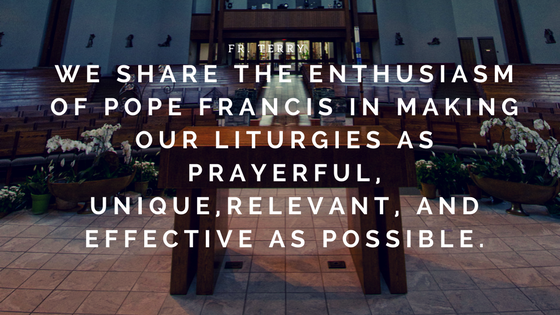
Many criticize the Catholic Church because it doesn’t “…change with the times.” I can see how people say this, because they don’t perceive many church changes in 50-75 or 100 year increments. This cycle of familiarity gives assurance and security to some. If we take a broader look, we see that the Church constantly changes, just not in the 6 month to one year cycle that most Americans are used to seeing change in things such as fashion, music, business strategies, electronics and more that shape our American culture. Other countries have various time frames for change and we always have to perceive the Catholic Church as THE world-wide institution, understanding that the rate of change varies greatly around the world.
It is in light of the above dynamic that I am unbelievably encouraged by the very recent document Magnum Principium issued on September 3 by Pope Francis on his own authority. This document modifies Canon Law and shifts responsibility and authority for the translation of liturgical texts into modern languages FROM the Congregation for Divine Worship and the Discipline of the Sacraments in Rome TO national and regional conferences of bishops. In other words, bishops in local provinces (several dioceses) will be responsible for and have authority of the translation of the language that we use to pray in our liturgical celebrations. This is not limited to the celebration of the Eucharist on week days and weekends, but for all sacramental and liturgical prayer. This is a significant change in the process of crafting the language with which we pray, once again an example of how the Church changes.
Many of you may notice that there was a fairly major revision in our liturgical language beginning in Advent 2011 in which we were asked to respond, “And with your spirit” after the perennial presider invitation, “The Lord be with you.” And, “Lord I am not worthy that you should enter under my roof…” as we are beholding the Lamb of God. Some of the changes I have found to be very prayerful, such as the various Eucharistic Prayers that I pray so often, and the additions of the bride and groom into the Eucharistic Prayer during weddings. Much of the language of Opening Prayers, Prayers at Offertory and Prayers after Communion I continue to struggle with.
These changes initiated by Francis also represent a significant shift in the role of the Roman Curia and fosters shared decision making between local churches and Rome. The fact that the pope used Canon Law to back up these changes indicates the intensity of his commitment to these changes.
Our own Cardinal Blase Cupich commented that these changes also indicate the commitment that Pope Francis has to the spirit of Vatican II and the document on the liturgy that it generated, Sacrosanctum Concilium. That document significantly altered and updated the language that was used in all liturgies, allowing people all over the world to pray in their native language instead of the universal Latin. As time went by, there were some concerns that the translations of the texts into “the vernacular or language of the people” was not accurate or prayerful. Subsequent changes and revisions by certain liturgical authorities in Rome have been perceived as limiting the spirit of Vatican II, which gave local and cultural expression to timeless and unchanging church beliefs such as the real presence of Christ in the Eucharist and many other key liturgical beliefs that will NEVER change.
As we continue to be committed to Vatican II here at Holy Family, I am sure that we share the enthusiasm of Pope Francis in making our liturgies as prayerful, unique, relevant and effective as possible. These changes will help in that process. The pope’s document Magnum Principium was released on September 9 and will take effect on October 1. The details of the effect on our liturgies will be shared as the Archdiocese of Chicago responds. Stay tuned!
Our Gospel this weekend is about forgiveness. Forgiveness, confession, examining one’s conscience, making a commitment to change, doing some form of penance and receiving the absolution of the Church are all parts of a larger spiritual and sacramental experience called Reconciliation. These are not confined to the Rite of Reconciliation, but the sacramental experience can certainly help in healing, forgiving and reconciling. The Sacrament of Reconciliation is a treasure for us Catholics. Not only do we believe that God forgives us, we sacramentalize it through a powerful ritual. Forgiveness and reconciliation are sacred human experiences and that is why we have a Rite for the sacrament which is private, prayerful and can be very cathartic. If you are one of many who have had a bad experience of a priest yelling at you in the “confessional” or haven’t received the sacrament in a long time, please consider giving it another try. I can speak for all of us priests here at Holy Family in saying that you will be met with a kind and prayerful presence in one of our many offerings of the Sacrament of Reconciliation, helping you to believe that God forgives you.
We wish to offer MORE times for people to take advantage of the Sacrament. As of January 1 we will offer Reconciliation every Wednesday from 6:00-6:45pm in the Reconciliation Room in the back of church, and continue to offer Form B (a Reconciliation service similar to what we offer in Advent and Lent which includes a scripture reading, brief homily, group examination of conscience and praying the Act of Contrition, and then individual confession and absolution) on the first Saturday of each month in the chapel at 4:00pm. The sacrament is always offered by appointment and as a group service during the seasons of Advent and Lent. In addition, other local parishes offer the sacrament at various times on Saturdays, but no other parish will offer it at 6:00pm on Wednesdays. Please note that our current Reconciliation schedule will remain in effect until January 1.